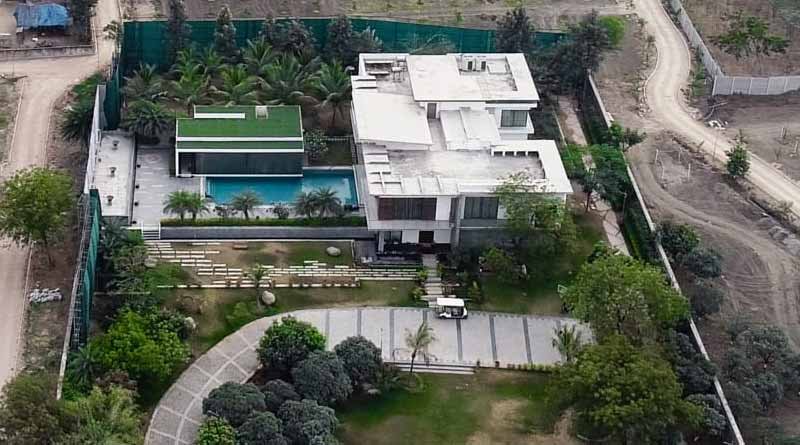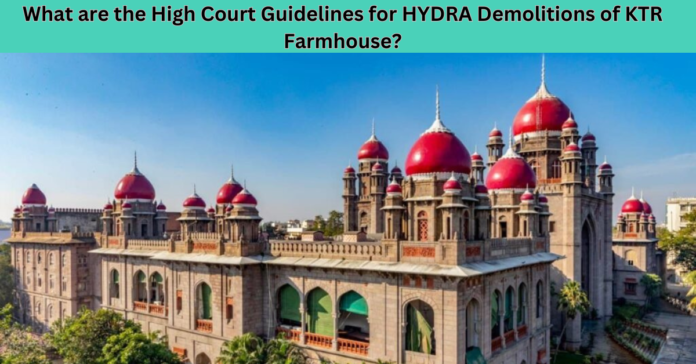Introduction:
The Telangana High Court Guidelines for HYDRA under the single bench of Justice Kunuru Lakshman, directed the Hyderabad Disaster Response and Assets Monitoring and Protection (HYDRA) on Wednesday to follow the due legal procedure before demolishing any illegal structures. This directive was issued during the hearing of a writ petition filed by B. Pradeep Reddy, a businessman from Jubilee Hills, seeking an injunction against the demolition of a farmhouse reportedly owned by the BRS Working President K. Tarakarama Rao.
Key Directives from the Court
Justice Lakshman emphasized that HYDRA must thoroughly review all documents related to the structures it intends to demolish. These include the sale deed, permissions obtained from competent authorities such as panchayats, municipalities, or GHMC, and payment receipts for electricity. The court directed Additional Advocate-General (AAG) Imran Khan to designate properties within the Full Tank Level (FTL) with a preliminary or final notification. Additionally, he was asked to submit data on the number of buildings demolished by HYDRA under GHMC and municipal jurisdiction since its inception. The writ petition remains pending for further adjudication.
Court’s Serious Concerns
Justice Lakshman expressed strong concerns about HYDRA’s actions, stating, “I am very serious on this matter. HYDRA officials cannot demolish illegal structures without following the due process of law.” The judge questioned the AAG on the legal provisions under which HYDRA carries out demolitions and whether notices are issued to landowners prior to such actions. In response, AAG Khan clarified that HYDRA does not issue notices; rather, the GHMC or the respective municipality issues notices, asking property owners to furnish the necessary documents.
Case Details and Observations
The petition revolves around a farmhouse, reportedly belonging to K. Tarakarama Rao, located in Survey No. 311/7, Janwada village, Shankarpally mandal, Ranga Reddy district. The property spans 3,895.12 square feet (1,210 square yards) and comprises a ground floor plus a first floor.

KTR Farmhouse in janwada (Source: Vaartha)
During the hearing, Justice Lakshman highlighted the potential inconsistencies within state departments. He pointed out that one department registers a property and grants construction permissions, while another, years later, declares the property as within the FTL and orders its demolition. He stressed that such actions undermine public confidence in the system. The judge also emphasized that HYDRA must apply the same approach to demolishing illegal structures, irrespective of whether the landowner possesses 60 square yards or 60 acres.
Further Directions and AAG’s Plea
Justice Lakshman directed the AAG to provide more information about HYDRA, including its legal status, powers, and activities. AAG Khan argued that the petitioner approached the court prematurely and urged the court not to pass any interim order, as it could negatively impact HYDRA’s work. He highlighted that HYDRA is responsible for protecting urban assets by demolishing illegal structures within the FTL of lakes, which is crucial for preserving these water bodies. Khan requested the court to dismiss the writ and allow HYDRA to continue its operations, noting that the farmhouse in question falls within the area governed by GO 111, which prohibits certain constructions.
The guidelines issued by the Telangana High Court regarding the demolition of illegal structures by the Hyderabad Disaster Response and Assets Monitoring and Protection (HYDRA)
Telangana High Court Guidelines for HYDRA Demolitions
1. Adherence to Due Legal Process:
HYDRA must strictly follow the due legal procedure before demolishing any illegal structures. This includes reviewing all relevant documents related to the property, such as:
1. Sale deeds
2. Permissions obtained from competent authorities (e.g., panchayats, municipalities, GHMC)
3. Payment receipts for utilities like electricity
2. Verification of Notifications:
HYDRA must ensure that any property targeted for demolition is verified through either a preliminary or final notification earmarking the property as located within the Full Tank Level (FTL) or other protected zones.
3. Consistency in Enforcement:
The approach taken by HYDRA in demolishing illegal structures must be consistent, regardless of the size or ownership of the land. This means there should be no discrimination whether the land in question is 60 square yards or 60 acres.
4. Coordination with Other Authorities:
While HYDRA has the power to remove illegal structures, it must coordinate with the GHMC or the respective municipality. Notices for document submission related to the property should be issued by these local authorities, not by HYDRA directly.
5. Court Supervision and Reporting:
HYDRA is required to report to the court with detailed information regarding its legal status, powers, and activities. The organization must also provide data on the number of buildings it has demolished under GHMC and municipal jurisdiction since its establishment.
6. No Discrimination in Demolition:
HYDRA must ensure that all actions taken are free from any bias or discrimination. The same legal process must be applied uniformly to all properties, regardless of the owner’s status or the property’s size.
7. Transparency and Accountability:
HYDRA’s activities should be transparent, and the organization must be held accountable for following the legal process. Any deviation from these guidelines may be subject to judicial review and further legal action.
These guidelines aim to ensure that demolitions are conducted legally, fairly, and without undermining public confidence in the system.
key guidelines for HYDRA’s adherence to due legal process:
| Guideline | Description |
|---|---|
| Adherence to Due Legal Process | HYDRA must review all relevant property documents before demolition, including sale deeds, permissions from authorities, and utility payment receipts. |
| Verification of Notifications | Ensure targeted properties for demolition are verified via preliminary or final notifications, confirming they are within FTL or other protected zones. |
| Consistency in Enforcement | HYDRA’s demolition approach must be consistent, regardless of land size or ownership, ensuring no discrimination in enforcement. |
| Coordination with Authorities | HYDRA must coordinate with GHMC or relevant municipalities, allowing them to issue document submission notices for properties instead of HYDRA directly. |
| Court Supervision and Reporting | HYDRA must report to the court on its legal status, powers, activities, and the number of demolitions conducted under GHMC and municipal jurisdictions. |
| No Discrimination in Demolition | HYDRA must apply the same legal process uniformly to all properties, ensuring actions are free from bias or discrimination. |
| Transparency and Accountability | HYDRA’s activities should be transparent and accountable, adhering strictly to legal processes to maintain public confidence. |
Conclusion:
The Telangana High Court has set forth clear guidelines to ensure that HYDRA while performing its duties, adheres to the due process of law in demolishing illegal structures. The court emphasized the importance of transparency, consistency, and accountability in these actions, ensuring that all property owners, regardless of their status or the size of their land, are treated fairly. By following these guidelines, HYDRA can effectively carry out its mandate to protect public assets while maintaining public trust and upholding the rule of law.
Frequently Asked Questions:
HYDRA is responsible for demolishing illegal structures in Hyderabad, but it must follow the due legal process, including verifying documents and coordinating with local authorities.
HYDRA must review sale deeds, permissions from competent authorities (like panchayats, municipalities, GHMC), and utility payment receipts before proceeding with any demolition.
HYDRA is required to apply the same legal procedures uniformly to all properties, regardless of the size of the land or the status of the owner.
Notices are issued by the GHMC or the respective municipality, not directly by HYDRA. These notices request property owners to provide relevant documents.
HYDRA must report its legal status, powers, activities, and demolition data to the court, ensuring transparency and accountability in its operations.
Suggested Articles:
HYDRA Commissioner AV Ranganath A New Era of Land Protection in Hyderabad
HYDRA Guidelines and Procedures: Latest News Updates HYDRA in Telangana.
HYDRA in Telangana: Revolutionizing Disaster Management and Asset Protection


